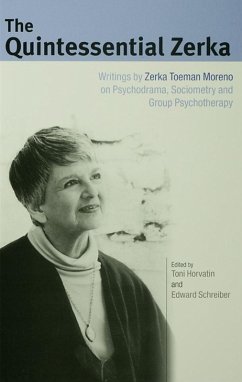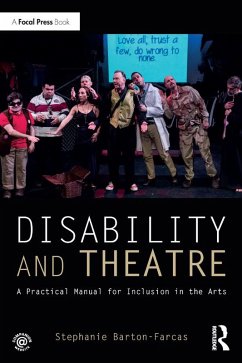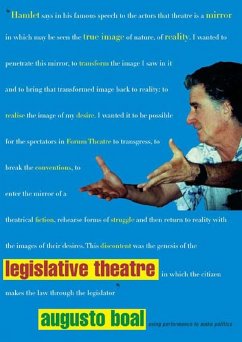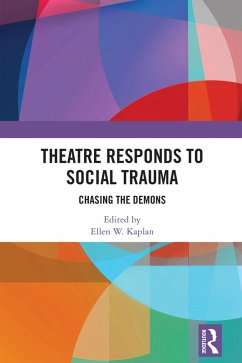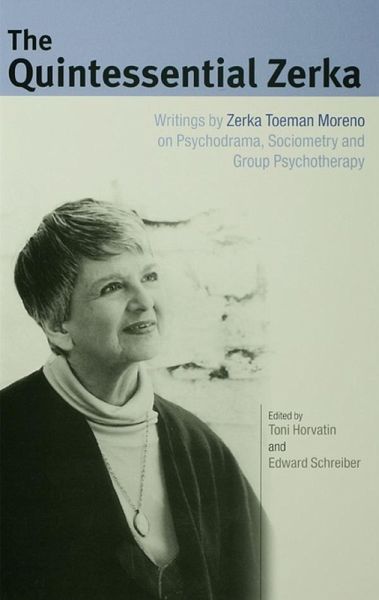
The Quintessential Zerka (eBook, ePUB)
Writings by Zerka Toeman Moreno on Psychodrama, Sociometry and Group Psychotherapy
Redaktion: Schreiber, Edward; Horvatin, Toni
Versandkostenfrei!
Sofort per Download lieferbar
54,95 €
inkl. MwSt.
Weitere Ausgaben:

PAYBACK Punkte
27 °P sammeln!
The Quintessential Zerka documents the origins and development of the theory and practice of psychodrama, sociometry and group psychotherapy through the work and innovation of its co-creator, Zerka Toeman Moreno.This comprehensive handbook brings together history, philosophy, methodology and application. It shows the pioneering role that Zerka, along with her husband J. L. Moreno, played in the development, not only of the methods of psychodrama and sociometry, but of the entire group psychotherapy movement worldwide. It demonstrates the extent to which Zerka's intuitive and intellectual grasp...
The Quintessential Zerka documents the origins and development of the theory and practice of psychodrama, sociometry and group psychotherapy through the work and innovation of its co-creator, Zerka Toeman Moreno.
This comprehensive handbook brings together history, philosophy, methodology and application. It shows the pioneering role that Zerka, along with her husband J. L. Moreno, played in the development, not only of the methods of psychodrama and sociometry, but of the entire group psychotherapy movement worldwide. It demonstrates the extent to which Zerka's intuitive and intellectual grasp of the work, combined with her superb ability to organize and synthesize, continue to exert an influence on the field. Toni Horvatin and Edward Schreiber have selected articles that span a career of some sixty years, from Zerka's very first publication to recent, previously unpublished, work. Personal anecdotes and poetry from Zerka herself provide a valuable context for each individual article. The selection includes:
This book provides a rich source of insight and inspiration for all those interested in the history, development and practice of psychodrama, sociometry and group psychotherapy, whatever their level of experience. It will be of interest to anyone involved in the fields of psychology, counselling, sociology, social work, education, theatre, or human relations.
This comprehensive handbook brings together history, philosophy, methodology and application. It shows the pioneering role that Zerka, along with her husband J. L. Moreno, played in the development, not only of the methods of psychodrama and sociometry, but of the entire group psychotherapy movement worldwide. It demonstrates the extent to which Zerka's intuitive and intellectual grasp of the work, combined with her superb ability to organize and synthesize, continue to exert an influence on the field. Toni Horvatin and Edward Schreiber have selected articles that span a career of some sixty years, from Zerka's very first publication to recent, previously unpublished, work. Personal anecdotes and poetry from Zerka herself provide a valuable context for each individual article. The selection includes:
- psychodrama, it's relation to stage, radio and motion pictures
- psychodramatic rules, techniques and adjunctive methods
- beyond aristotle, breuer and freud: Moreno's contribution to the concept of catharsis
- psychodrama, role theory and the concept of the social atom.
This book provides a rich source of insight and inspiration for all those interested in the history, development and practice of psychodrama, sociometry and group psychotherapy, whatever their level of experience. It will be of interest to anyone involved in the fields of psychology, counselling, sociology, social work, education, theatre, or human relations.
Dieser Download kann aus rechtlichen Gründen nur mit Rechnungsadresse in A, B, BG, CY, CZ, D, DK, EW, E, FIN, F, GR, HR, H, IRL, I, LT, L, LR, M, NL, PL, P, R, S, SLO, SK ausgeliefert werden.




